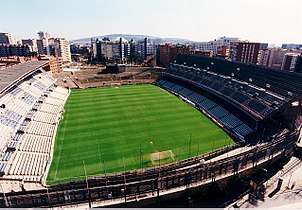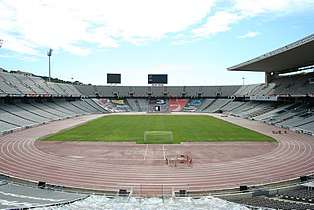RCD Espanyol
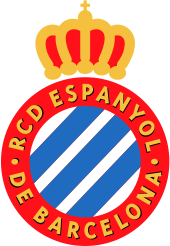 | ||||
| Full name |
Real Club Deportivo Espanyol de Barcelona, S.A.D. | |||
|---|---|---|---|---|
| Nickname(s) | Periquitos (Budgerigars) Blanquiazules (White and Blue) Mágico (Magical) | |||
| Short name | RCDE, ESP | |||
| Founded |
28 October 1900 as Sociedad Española de Football | |||
| Stadium | RCDE Stadium | |||
| Capacity | 40,500[1] | |||
| Owner | Rastar Managerial Group | |||
| President | Chen Yansheng | |||
| Manager | Rubi | |||
| League | La Liga | |||
| 2017–18 | La Liga, 11th | |||
| Website | Club website | |||
|
| ||||
Reial Club Deportiu Espanyol de Barcelona (Catalan pronunciation: [rəˈjal ˈklub dəpuɾˈtiw əspəˈɲɔl də βəɾsəˈlonə]; Royal Spanish Sports Club of Barcelona), commonly known as RCD Espanyol, or simply as Espanyol, is a professional sports club based in Barcelona, Spain.
Founded in 1900, the club plays in La Liga, the highest division of Spanish football and play their home games at the RCDE Stadium, which holds up to 40,500 spectators. Espanyol have won Copa del Rey four times, most recently in 2006, and reached the UEFA Cup final in 1988 and 2007. The team competes in the Barcelona Derby against FC Barcelona.
History
Foundation and club culture
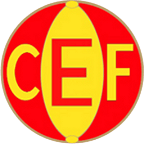
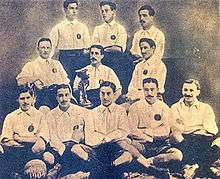

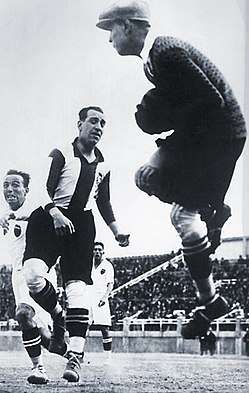
Espanyol was founded on 28 October 1900 by Ángel Rodríguez Ruiz (1879–1959), an engineering student at the University of Barcelona. The club's original home was in the well-off district of Sarrià and was initially known as the Sociedad Española de Football. One year later, the club changed its name to Club Español de Fútbol. Espanyol was the first club in Spain to be formed exclusively by Spanish fans of the game.
The club originally played in bright yellow shirts, with the colour of the shorts being left to the individual player. A friend of the club founder owned a textile business and happened to have an abundance of yellow material left over from a job. In 1910, the club changed its name to Club Deportivo Español and chose blue and white stripes as shirt colours and as the central colours of the club badge. Blue and white was chosen in homage to the colours appearing on the shield of the great Sicilian-Aragonese Admiral Roger de Lluria, who sailed the Mediterranean protecting the interests of the Crown of Aragon in the Middle Ages. The club were successful from the very beginning, winning the Campionat de Catalunya in 1903 and subsequently playing in the Copa del Rey.
Development of club's name
In 1906, the club folded due to financial reasons and most of the players joined the X Sporting Club. This club won the Campionat de Catalunya three times between 1906 and 1908. In 1909, this club was effectively relaunched as Club Deportivo Español, and in 1910, they adopted their present-day colours. Espanyol are one of several Spanish football clubs granted patronage by the Spanish crown and thus entitled to use Real in their names and the royal crown on their badge. This right was granted to Espanyol in 1912 by Alfonso XIII and the club subsequently became known as Real Club Deportivo Español.[2]
Following the abdication of the same king in 1931 and the declaration of the Second Spanish Republic, due to prohibition of royal symbols, the club adopted the more Catalan/republican friendly name, Club Esportiu Espanyol. After the Spanish Civil War, the name reverted.
The club took the Catalan spelling for its name in February 1995. The word "Deportiu" in Reial Club Deportiu Espanyol de Barcelona is a Catalanised form of the original word "Deportivo" (Castilian), despite the correct word being "Esportiu" in the Catalan language. This choice was made in order to retain the initials "RCD" in the club's name.
In 1994, Espanyol created its reserve team, Espanyol B, currently playing in the Segunda División B.
2006–07 UEFA Cup
With their win in the Copa del Rey the previous season, Espanyol entered the UEFA Cup. Following a 5–3 aggregate success against Slovak side Artmedia Bratislava, they were drawn in Group F alongside Ajax, Belgian minnows Zulte Waregem, Sparta Prague and Austria Wien. Espanyol were group winners, victorious in all four of their ties.
Their opponent in the Round of 32 was Livorno, who had just scraped into the knockout stages. Espanyol were 4–1 victors on aggregate, recording a 2–1 win in Tuscany and finishing the job 2–0 in Barcelona. Next up was Israeli side Maccabi Haifa, and after a dour 0–0 draw in the away leg, Espanyol thrashed their Israeli counterparts 4–0 in the second leg. Many were starting to see Espanyol as favourites to go all the way to the final in Glasgow's Hampden Park.
If that were to be the case, however, Espanyol would have to defeat Portuguese club Benfica, two-time European Cup winners. Espanyol did not seem fazed by this, as they raced into a 3–0 lead in Spain. However, Benfica fought back and scored two away goals to leave the tie firmly in the balance. Nevertheless, Espanyol survived a daunting trip to Lisbon, coming away with a 0–0 draw, which was enough to book them a place in the semi-finals.
Germans Werder Bremen lay in wait for the Catalan side in the last four, but once again, Espanyol produced a brilliant home performance to virtually seal the tie on the night. A 3–0 rout of the Germans put the Spanish firmly in control, and any real doubts about their passage to the final disappeared, with a 2–1 win in Bremen. In the final, held on 16 May in Glasgow, Espanyol fell to fellow La Liga side Sevilla, losing 3–1 in a shootout following a 2–2 draw.[3] They became the only football team in UEFA Cup history to remain unbeaten in the tournament, yet didn't take home the trophy. Walter Pandiani, who would leave the club at the end of the season, was the top goal scorer of the UEFA Cup of that season.
On 9 June 2007, Raúl Tamudo became Espanyol's highest-ever goalscorer after surpassing the 111 goals scored by Rafael Marañón. (Tamudo also scored his 113 goal in the night.) One of the most memorable of Tamudo's goals was his 90th-minute match equalizer away at the Camp Nou against rivals Barcelona in 2006–07. The goal, which secured a 2–2 draw, cost Barcelona the Liga title after it finished level on points (76) with champions Real Madrid, but with a poorer head-to-head record.
On 31 May 2009, Espanyol played its last match at the Estadio Olímpico de Montjuic, a 3–0 defeat of Málaga. Espanyol played in the Olympic Stadium of Montjuic after moving from their all life ground in Sarria. With the move, club talisman Raúl Tamudo had the unique distinction of having played in three different home stadiums with his club: Sarrià, Montjuïc and, beginning in the 2009–10 season, the Cornellà-El Prat.
Recent years
After 12 seasons playing at the Estadi Olímpic de Montjuïc, Espanyol moved to the Estadi de Cornellá-El Prat. The new stadium was officially inaugurated on 2 August 2009 with a match between Espanyol and Liverpool. The periquitos ("budgerigars") won 3–0, with Luis García scoring the first goal at the ground, followed by a Ben Sahar double.
On 8 August 2009, Espanyol captain Daniel Jarque, then 26, died from a cardiac arrest in the Italian village of Coverciano, where the club was at the time after playing several fixtures in Italy.[4] Since then, at every match in the 21st minute – his former shirt number – for a full minute an ovation is made in his honour. Espanyol supporters also pay tribute to Jarque by singing his name.
On 10 September 2009, the IFFHS published the best European Clubs classification during the 20th century, ranking Espanyol 98th due to their European participations. Mauricio Pochettino, former player, was named manager of the team during the 2008–09 season in order to prevent the team from relegation to the Second Division; an objective that he fulfilled, the Club carries out a sport project based in the promotion of footballers coming from the Club lower teams as well as within this environment of cutbacks. In subsequent seasons, the Club managed to stay in the First Division trouble free, even in certain moments the team fought to take part in the UEFA Europa League. Nevertheless, after 14 matches in season 2012–13, the Directors of the Club fired Pochettino since the team was last in the classification. A few days later, Mexican coach Javier Aguirre took over managing to revert the situation and obtaining good results.
Javier Aguirre carried on in charge one more year and again he managed to keep the Club in the First Division in the course of a so-called transition season. Sergio González took over in the summer of 2014 and in his first season the team reached the semifinal of the Cup and the team ended the league with no difficulties in staying in the First Division. But in December 2015, the Board of Directors decided to sack him in view of poor results obtained.[5] It was then Constantin Galca, another former Espanyol player, who was appointed as new Manager.[6]
At the same time, there were remarkable changes office-wise. President Joan Collet and his Board of Directors resigned on 20 January 2016 and Chen Yansheng took charge of the management of the Club. The Rastar Managerial Group owner bought out the shares in November 2015. His shareholding of over 50% of the written down capital meant he was able take full control. The operation was completed on 29 January 2016 when the acquisition was finally confirmed.[7] His takeover was crucial to cover several payments with the Treasury as well as various suppliers.
Rivalries
El derbi Barceloní
In the first half of the 20th century during the Miguel Primo de Rivera dictatorship (1923–1930), FC Barcelona was seen as a club of the catalanism nationalism ideology in stark contrast to RCD Espanyol which cultivated a kind of compliance to the central authority .[8]
In 1918 the municipalities of Catalonia promote a campaign to request to the Spanish Government a Statute of Autonomy. FC Barcelona joins that request and the Catalan press explains it by saying "F. C. Barcelona has become the club of Catalonia" .The other great team of the city, RCD Espanyol is dissociated from the claim.
In the present FC Barcelona is close to power in Catalonia, the last presidents have placed the club in a favourable position to Catalan independence movement and the holding of a referendum even with discomfort in a little part of the fans in Catalonia and practically the totality of the fans in the rest of Spain.[9] Although some of the directors of the RCD Espanyol have manifested their independentist ideology the club stay out of politics and it is considered that most of the fans are against the independence of Catalonia.[10]
On numerous occasions the RCD Espanyol has complained of an unfavourable treatment and sometimes directly offensive according to them towards the club in favour of FC Barcelona by some public media dependent on the Generalidat of Catalonia like TV3.[11][12][13]
Despite these differences in ideology, the derbi has always been more relevant to Espanyol supporters than Barcelona ones due to the difference in objectives.
Though it is the most played local derby in the history of La Liga, it is also the most unbalanced, with Barcelona overwhelmingly dominant. In the league table, Espanyol has only managed to end above Barça on three occasions in almost 70 years and the only all-Catalan Copa del Rey final was won by Barça in 1957. Espanyol has the consolation of achieving the largest margin win with a 6–0 in 1951.
Espanyol achieved a 2–1 win against Barça during the 2008–09 season, becoming the first team to defeat Barcelona at Camp Nou in their treble-winning season.[14]
Stadium
From 1923 until 1997, Espanyol played their home games in Estadi de Sarrià in the Sarrià-Sant Gervasi district of Barcelona. In 1997, they moved to the Estadi Olímpic Lluís Companys on Montjuïc. For the beginning of the 2009–10 season, Espanyol moved into the newly constructed RCDE Stadium (also known as Estadi Cornellà-El Prat) between Cornellà de Llobregat and El Prat de Llobregat.
Competition summary
- 80 seasons in Primera División
- 4 seasons in Segunda División
- 7 participations in UEFA Cup
- 2 participations in Inter-Cities Fairs Cup
- 2 participations in UEFA Intertoto Cup
Achievements
- In 1928, Espanyol became a founding member of La Liga, and in 1929, the team won their first Copa del Rey. Espanyol has completed the highest number of seasons in La Liga without actually winning the title.
- The team has qualified seven times for the UEFA Cup (including the 2006–07 qualification following the 2006 Spanish Cup win) and reached the final in 1988,[15][16][17][18] losing to Bayer Leverkusen of then-West Germany on penalty kicks (3–2), after a memorable home-and-away final (3–0 in Barcelona, 0–3 in Leverkusen)[19][20] and in 2007, losing to Sevilla on another penalty kicks round (3–1), after a memorable match (ended 1–1 after normal time, and 2–2 after extra time).
Honours
Men's football
Domestic competitions
- Winner (1): 1993–94
International competitions
Regional competitions
- Winners (11): 1903–04, 1905–06, 1906–07, 1907–08, 1911–12, 1914–15, 1917–18, 1928–29, 1932–33, 1936–37, 1939–40
- Winners: 2016[24]
Women's football
Players
Current squad
- As of 31 August 2018[25]
Note: Flags indicate national team as defined under FIFA eligibility rules. Players may hold more than one non-FIFA nationality.
|
|
Reserve team
Note: Flags indicate national team as defined under FIFA eligibility rules. Players may hold more than one non-FIFA nationality.
|
Out on loan
Note: Flags indicate national team as defined under FIFA eligibility rules. Players may hold more than one non-FIFA nationality.
|
Retired numbers
21 ![]()
Players with most appearances
- Competitive, professional matches only.
As of 14 April 2018
| Name | Years | League | Second Division | League Cup | Other | Total | |
|---|---|---|---|---|---|---|---|
| 1 | 1996–2010 | 340 | – | – | 49 | 389 | |
| 2 | 1950–1964 | 301 | 14 | – | 42 | 357 | |
| 3 | 1965–1976 | 269 | 31 | – | 43 | 343 | |
| 4 | 1994–2006 | 275 | – | – | 45 | 320 | |
| 5 | 1993–2003 | 238 | 28 | – | 44 | 310 | |
| 6 | 1982–1990 | 241 | 33 | 19 | 10 | 303 | |
| 7 | 1979–1988 | 259 | – | 18 | 9 | 286 | |
| 8 | 1974–1984 | 264 | – | 6 | 15 | 285 | |
| 9 | 1974–1983 | 261 | – | 4 | 14 | 279 | |
| 10 | 1982–1991 | 216 | 33 | 15 | 12 | 276 |
- 1Includes Copa del Rey data only from 1943-1944 to 1975-1976, and since 1992-1993.
Managers
|
|
|
Presidents
|
|
|
|
Historical departments of RCD Espanyol
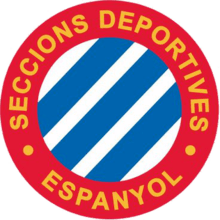
Until the 1990s, Espanyol had several sporting sections. In March 2017, the Association of Supporters and Shareholders of RCD Espanyol boosted a project for recovering the sporting sections of the club, but this time without any economic link with the football team. The new multi-sports club was created with the name of Seccions Deportives Espanyol (Sporting sections Espanyol).[26]
Two months later, the Association confirmed that Espanyol would start competing in the 2017–18 season, with a roller hockey team and women's volleyball teams.[27] In the next season, the basketball section was refounded and a new section of handball would be created.
Men's basketball
- Winners (1): 1941
- Winners (2): 1931, 1932
- Runners-up (3): 1941, 1943, 1954
Women's basketball
- Winners (1): 1943
- Runners-up (1): 1944
Men's hockey
- Winners (11): 1944, 1947, 1948, 1949, 1951, 1954, 1955, 1956, 1957, 1961, 1962
- Runners-up (4): 1946, 1952, 1953, 1958
Women's volleyball
- Winners (3): 1985, 1988, 1991
- Winners (5): 1984, 1985, 1986, 1990, 1992
Men's baseball
- Winners (2): 1946, 1953
See also
References
- ↑ RCDE Stadium – RCD Espanyol Official Page
- ↑ "History". RCD Espanyol. Retrieved 27 January 2018.
- ↑ "Palop ensures cup joy for Sevilla". uefa.com. 17 May 2007.
- ↑ "Espanyol stunned by Jarque death". BBC. 8 August 2009.
- ↑ "Sergio González is resigned". rcdespanyol.com. 14 December 2015.
- ↑ "Constantin Galca, new coach of RCD Espanyol". rcdespanyol.com. 14 December 2015.
- ↑ "Official statement". rcdespanyol.com. 20 January 2016.
- ↑ Missiroli, Antonio (March 2002). "European football cultures and their integration: the 'short' Twentieth Century". Europa (web portal). Retrieved 1 July 2009.
- ↑ Temprano, Alejandra (2016-01-11). "El Barça cae en su trampa con el tuit de la vergüenza de Bartomeu". esdiario.es. Retrieved 2017-06-17.
- ↑ MARCA.com (2015-09-10). "Joan Collet: "Vamos a dar guerra al Madrid"". MARCA.com (in Spanish). Retrieved 2017-06-17.
- ↑ "El Espanyol "exige" la retirada de la campaña 'Si sientes el Barça, sientes Cataluña'". ELMUNDO (in Spanish). Retrieved 2017-06-17.
- ↑ BARCELONA, SERGI LÓPEZ-EGEA / (2016-03-03). "Ensenyament retira un texto ofensivo con el Espanyol". El Periódico (in Spanish). Retrieved 2017-06-17.
- ↑ "El Espanyol y el Joventut denuncian pensamiento único en Cataluña". Economiadigital (ed. general). Retrieved 2017-06-18.
- ↑ "How Mauricio Pochettino's Espanyol beat Pep Guardiola's Barcelona". skysports.com. 1 October 2016.
- ↑ Licia Granello (October 22, 1987). "Il Milan è già disperato". la Repubblica (in Italian). p. 25.
- ↑ Licia Granello (November 5, 1987). "Un Milan senza attacco Una partita senza storia". la Repubblica (in Italian). p. 33.
- ↑ Gianni Mura (November 26, 1987). "Ma l' Inter soffre ancora". la Repubblica (in Italian). p. 23.
- ↑ Gianni Mura (December 10, 1987). "L' Inter perde l' ultima chance". la Repubblica (in Italian). p. 23.
- ↑ "Finale UEFA Tre gol dell' Espanyol". la Repubblica (in Italian). May 5, 1988. p. 33.
- ↑ "Coppa UEFA Il Bayer vince ai rigori". la Repubblica (in Italian). May 19, 1988. p. 23.
- ↑ "Spain – List of Cup Finals". Rec.Sport.Soccer Statistics Foundation (RSSSF). Retrieved 9 April 2016.
- ↑ "Spain – List of Second Division Champions". Rec.Sport.Soccer Statistics Foundation (RSSSF). Retrieved 9 April 2016.
- ↑ "Spain – List of Champions of Catalonia". RSSSF. Retrieved 17 February 2017.
- ↑ "El Espanyol gana la Supercopa" [Espanyol win the Supercup]. Mundo Deportivo. Roger Torelló. 25 October 2016. Retrieved 6 May 2018.
- ↑ www.rcdespanyol.com, RCD Espanyol -. "First Team - RCD Espanyol". www.rcdespanyol.com.
- ↑ "Pericos sobre ruedas" (in Spanish). La Vanguardia. 15 March 2017. Retrieved 26 May 2017.
- ↑ "Reneix el gegant adormit" (in Catalan). L'Esportiu de Catalunya. 26 May 2017. Retrieved 26 May 2017.
External links
| Wikimedia Commons has media related to RCD Espanyol. |
- Official website (in Catalan) (in Spanish) (in English)
- RCD Espanyol at La Liga (in English) (in Spanish)
- RCD Espanyol at UEFA (in English) (in Spanish)
